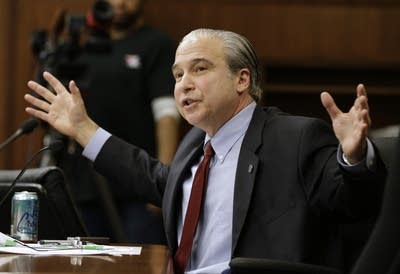Minnesota lawmakers debate competing background check bills
Go Deeper.
Create an account or log in to save stories.
Like this?
Thanks for liking this story! We have added it to a list of your favorite stories.

Minnesota lawmakers continue to debate two competing background check bills just as Congress is considering a universal background check law.
States can pass gun laws that are more restrictive than federal gun laws. And they often do. For instance, Minnesota is more restrictive than the federal government when it comes to determining who is legally able to possess a firearm. However, when a federal gun law is more restrictive than state law, the state has to enforce the federal statute.
Currently in Minnesota, it is legal for a person to buy a gun from a private seller without undergoing a background check. Congress could make that kind of transaction illegal by passing a more restrictive background check law.
• Momentum for gun control legislation slows in Washington
• Comparison of gun bills in Minnesota Legislature
Turn Up Your Support
MPR News helps you turn down the noise and build shared understanding. Turn up your support for this public resource and keep trusted journalism accessible to all.
Hennepin County Sheriff Rich Stanek said Congress should be careful about infringing on state's rights.
"Many of the states in the union have said, 'look, we know what's best for our individual citizens,'" Stanek said. "And so you get this push-pull between states' rights versus what the federal government may or may not want to do."
"I remain confident that we can pass a universal background check provision in the Senate."
Stanek, a former Republican legislator, said he would like lawmakers at both the state and federal levels to focus on closing gaps in the National Instant Criminal Background Check System. He said only a quarter of states contribute mental health and criminal conviction data to the database.
Stanek also says expanding background checks to include private sales will put more strain on the Bureau of Alcohol, Tobacco, Firearms and Explosives.
"It's going to be another thing for the ATF to do," Stanek said. "And the ATF has been very honest about this, saying 'we can't keep up with what we have now.'"
A representative from the ATF declined to comment for this story. However, Scott Sweetow, special agent in charge of the ATF's St. Paul branch, has said his division has 25 agents who are responsible for regulating firearms sales at more than 7,000 federally licensed dealers throughout Minnesota, Wisconsin and the Dakotas.
Several other states, including Colorado and Connecticut, recently passed universal background check laws. Some Minnesota legislators believe the same is possible here.
"I remain confident that we can pass a universal background check provision in the Senate," said Sen. Ron Latz, DFL-St. Louis Park. Latz is the sponsor of a bill that would require most private gun sales to be subject to a background check. The bill is currently awaiting action in the Senate Rules and Administration committee.

Latz's bill, SF458, would require a person selling a handgun or a so-called semi-automatic military-style assault weapon to conduct a background check on the buyer before completing the sale. Under this proposal, the seller would transfer the gun to a federally licensed dealer. The dealer would conduct the background check and transfer the gun to the buyer provided they are legally able to possess the gun. Under this bill, a background check is not required if the parties are closely related by blood or marriage.
Latz's bill is more broad than House proposal sponsored by Rep. John Lesch, DFL-St. Paul. The Lesch bill, HF285, is currently awaiting action on the House floor and covers only private gun sales that occur at gun shows. Under this proposal, a buyer will have to show the seller a valid handgun carry permit or present a state permit to purchase. The latter is already required of any person buying a handgun or semi-automatic military-style assault weapon from a federally licensed dealer in Minnesota. A person with either of these documents has already passed a background check.
That means the two differing versions of background check legislation will likely have to be resolved in conference committee.
House Public Safety Finance and Policy Committee chair Michael Paymar, who supports universal background checks, said Latz's broader Senate bill is the kind of legislation he would like to see pass in Minnesota and across the nation.
"The Latz bill is the companion of my original bill," Paymar said. "That's very much alive and that's what -- for Minnesotans who want to do something about gun violence prevention -- that's what people should be advocating for, is that bill emerging out of conference committee."




